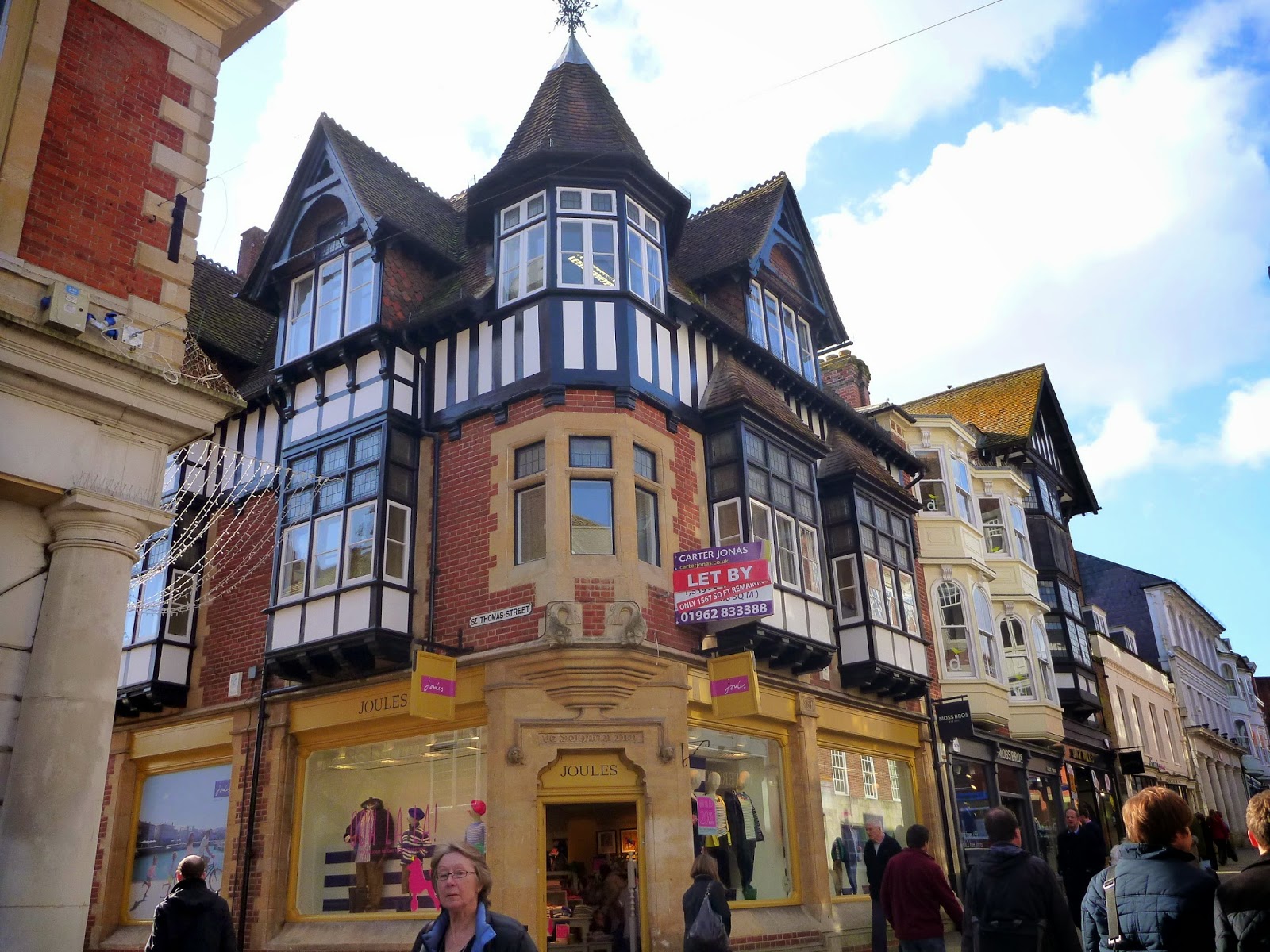We had a very pleasant three-day break in Winchester last week which we thoroughly enjoyed. It was our first visit and we liked the place and what it has to offer.
The area around Winchester has been inhabited since prehistoric times, the city has prospered since the Roman period and was known in Medieval times as the capital of Wessex.
Lots of historical buildings give the city its special appeal.
This is Parchment Street distinctive due to the Kite Flyer by Marcia Colonna which you can see in the distance.
Winchester Business Centre on Parchment Street, with beautiful stained glass windows
Some beautiful stone buildings
as well as timber framed ones
The City Cross, also known as the Buttercross, has been dated to the 15th century and features 12 statues of the Virgin Mary, saints and various historical figures. In 1770 Thomas Dummer purchased the Buttercross from the Corporation of Winchester, intending to have it re-erected elsewhere. When the workmen arrived to dismantle the cross, they were prevented from doing so by the people of the city who 'organised a small riot'.
There was a small market on the High Street when we visited

and a much larger vintage and antiques market on the Sunday.
The vibrant High Street
has a very distinctive clock that dates back to the 19th century.
At the end of the High Street is Westgate, one of two surviving fortified gateways in the city
and this little alleyway leads from the High Street to the Square
where the City Museum is and where we saw an exhibition of the history of the city.
Minster Street
and one of its houses that was lit up by the sun as we wandered about
and next to it, Little Minster Street
Christ's Hospital
A plaque on the wall says: 'Christ's Hospital, which was founded in the Year of our Lord 1607 by Peter Symonds, a Native of Winchester and afterwards a Mercer in the City of London. The Endowments of this House are applied to the maintenance of Six Old Men, One Matron, and Four Boys, and also to the Assistance of One Scholar in each of the Two English Universities'.
Kingsgate, the second surviving medieval gate. The name was first recorded in 1148. It's on, or near, the site of one of the Roman gates to the city. Above the gate is the small church of St Swithun-upon-Kingsgate, built in the Middle Ages and is unusual in forming a part of the fabric of the old city walls. It achieved some literary fame under the fictional name of St Cuthbert's in Anthony Trollope's novel The Warden.
College Street
On Jewry Street, the United Church
with two modern stained glass windows
by King Alfred's statue, this small, gorgeous terrace
and a closer look.

Almshouses, North Side
one more look.




























Eirene, I hope that you had good weather for all three days. Winchester is a lovely place to visit. You have reminded me that I should go back there as I have not visited for many years now. Funny how that seems to happen. When we first moved here in 1990 I attended a life class at Winchester School of Art every Tuesday evening for two years.
ReplyDeleteI imagine you must have visited the cathedral and also seen the round table - did you manage to see the exhibition of Henry Moore prints at the Discovery Centre in Jewry Street? I might make that my excuse to visit soon.
We really enjoyed our stay in Winchester Olga, loved the place. We had glorious weather on Friday and Sunday, not so good on Saturday, but that was the day when we did a lot of the indoor stuff, so that was o.k. We visited all three of the places you mention and posts will follow. The Henry Moore prints are definitely worth seeing so as you say, a perfect excuse for you to go back. One of the things I really liked was the public art - such a wonderful thing to have in a town/city. I reminded me of the time a friend visited Oxford and said how surprised he was that there was not much public art, something I had not thought of before, but true. Winchester on the other hand, has lots and very interesting too.
Delete